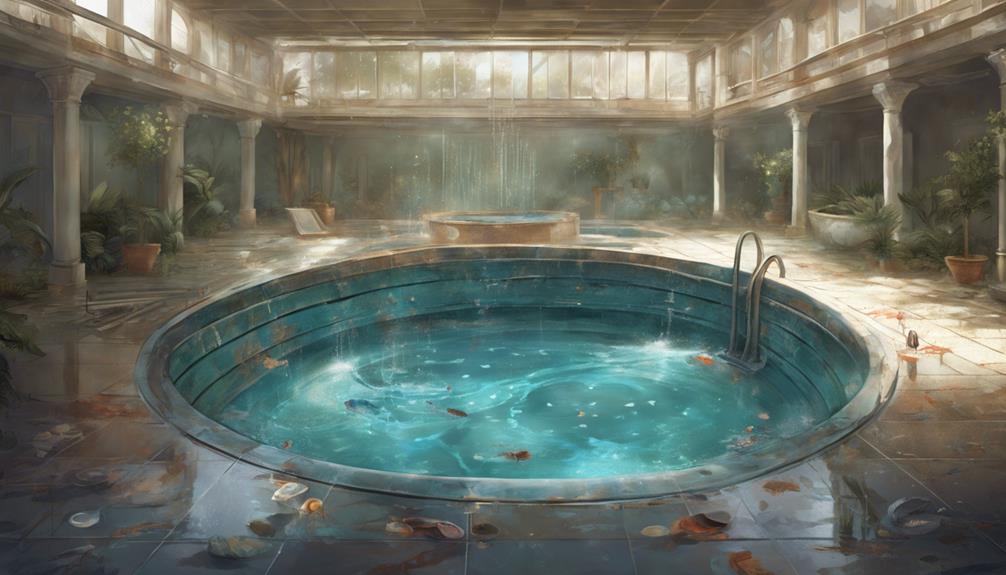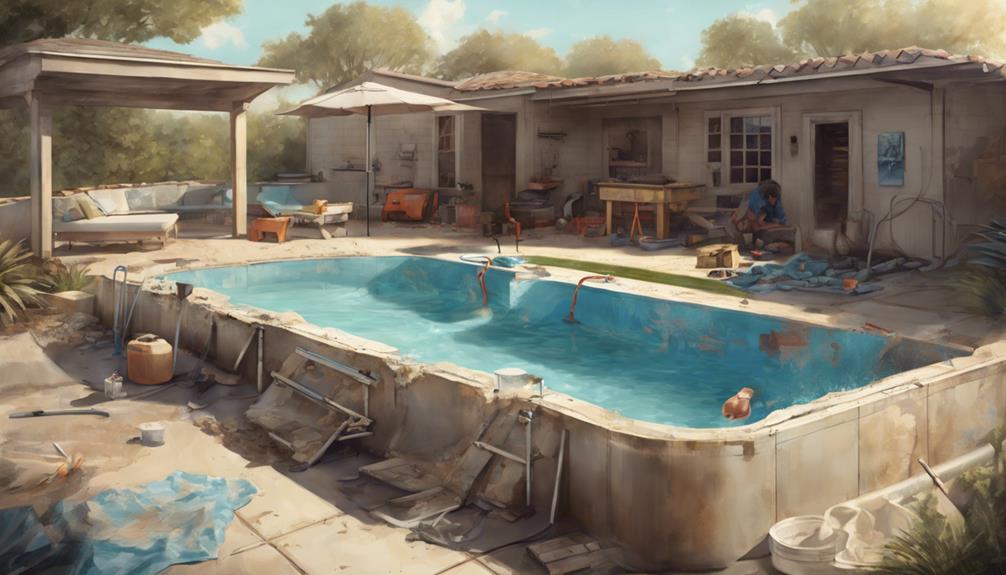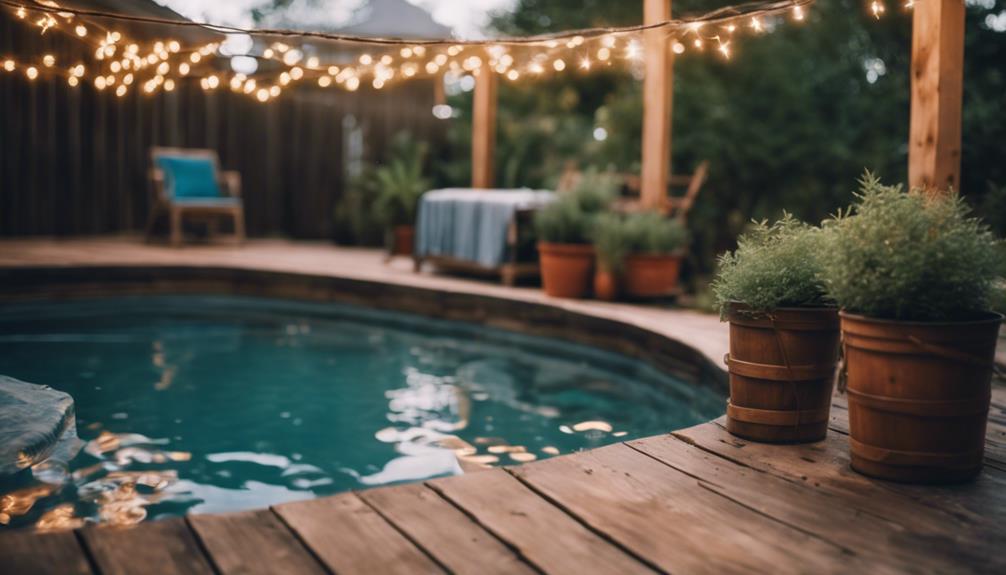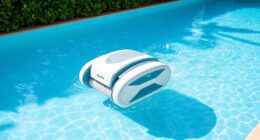Discover a world where pool design goes beyond boundaries, blending creativity with state-of-the-art technology. Customization is key, shaping your watery oasis to mirror your unique preferences and desires. Every detail, from different water features to suction power and purification systems, is essential in creating a dream pool. Delve deeper into the step-by-step procedures that oversee the installation process, ensuring a seamless integration of style and functionality. Embark on a captivating journey through a stunning collection of pool designs that challenge traditional standards, offering a glimpse into the enchanting world of aquatic marvels.
Key Takeaways
- Pool design involves size, shape, water type, and technology selection.
- Customization options cater to individual preferences and style choices.
- Proper suction functions like skimmers and main drains maintain water quality.
- Filtration systems are crucial for removing impurities and ensuring water clarity.
- Installation steps include planning, excavation, construction, plumbing, and safety checks.
The Basics of Pool Design
When considering the basics of pool design, it is crucial to understand that swimming pool design involves a thorough evaluation beyond mere size and shape. The quality of a pool is influenced by factors such as water type, technology, and overall functionality.
Customization options play a critical role in creating a pool that meets individual preferences and needs. Shoreline Pools, a renowned expert in the field, offers valuable insights into the best pool styles and features available.
Building a dream pool requires careful consideration of these elements to guarantee a final product that not only looks visually appealing but also functions efficiently for years to come.
Choosing the Right Water Type
Selecting the appropriate water type for a swimming pool is a critical decision that greatly impacts its maintenance and overall performance. The two main options for pool water are freshwater and saltwater. Freshwater pools can be filled with city water, well water, or transported water. Water quality can vary based on the water source, with well water being cost-effective but potentially containing copper and iron. On the other hand, transported water is convenient but comes with a higher cost for filling pools. Here is a comparison table detailing the key differences between freshwater and saltwater pools:
| Freshwater Pools | Saltwater Pools |
|---|---|
| City, well, or transported water | Dissolved salt for water |
| Variable water quality | Consistent water quality |
| Potential for mineral buildup | Less maintenance on water chemistry |
Essential Suction Functions in Pools

Understanding the essential suction functions of pools is pivotal for maintaining ideal water quality and cleanliness. In-ground pools are equipped with skimmers and main drains to facilitate these functions.
Skimmers play a key role in removing debris such as dirt, oil, leaves, and bugs from the pool surface, preventing them from sinking and affecting water quality.
Main drains, typically located in the deepest part of the pool, guarantee that the pump does not run dry by circulating water effectively.
Together, skimmers and main drains help to keep maintenance costs low and maintain a hygienic swimming environment. Proper maintenance and regular checks on these suction functions are vital to the overall health and longevity of the pool system. Neglecting these essential components can lead to costly repairs and potential water contamination, both of which can significantly impact the pool’s usability. One of the common pool buying mistakes is overlooking the importance of high-quality skimmers and efficient main drains, which are crucial for effective water circulation. Ensuring these systems are properly installed and functioning optimally can prevent future issues and provide a safe, enjoyable swimming experience.
Importance of Filtration Systems
The filtration system is an essential component in maintaining clean and healthy pool water. It plays a crucial role in removing impurities and debris from the water, ensuring a safe and enjoyable swimming experience.
Filtration systems work by passing water through various types of filters such as sand, diatomaceous earth, or cartridge filters. These filters trap particles and contaminants, preventing them from circulating back into the pool. Proper filtration also helps in preventing algae growth and maintaining water clarity.
Additionally, filtration systems promote water circulation through return jets, aiding in the distribution of chemicals and maintaining balanced water chemistry. Regular maintenance of the filtration system is necessary to uphold water quality and prevent any issues related to poor filtration.
Steps to Installing a Swimming Pool

Installing a swimming pool involves a series of meticulous steps that guarantee the proper integration of various components for a functional and aesthetically pleasing aquatic feature.
The process begins with careful planning and obtaining necessary permits. Excavation follows, where the pool shape is outlined, and the area is cleared.
Next, the pool shell is constructed, typically using concrete, vinyl, or fiberglass. Plumbing and electrical work are then completed, ensuring proper water circulation and lighting.
The pool is then backfilled and the surrounding area is finished with decking or landscaping. Finally, filling the pool, adding chemicals, and conducting safety checks complete the installation process.
Attention to detail at each step is essential for a successful pool installation.
Frequently Asked Questions
Can I Use Borehole Water for My Pool?
Yes, borehole water can be used for a pool. However, it's important to test the water quality for minerals like copper and iron. Consult with pool professionals to guarantee proper treatment and maintenance for best pool performance.
What Is the Purpose of Return Jets in Pools?
'Still waters run deep. Return jets in pools serve to enhance water circulation, promoting filtration efficiency and preventing stagnation. They play an essential role in maintaining water quality and ensuring a clean and inviting swimming environment.'
How Often Should Pool Filters Be Replaced?
Pool filters should be replaced based on their type and usage. Generally, sand filters last 5-8 years, while diatomaceous earth filters need replacement after accumulating dirt. Cartridge filters require more frequent changes, not ideal for large pools.
Are There Eco-Friendly Pool Water Options?
Exploring eco-friendly pool water options showcases the industry's commitment to sustainability. From freshwater to saltwater choices, pool owners can create environmentally conscious swimming experiences. Consult with professionals to select the ideal eco-friendly water solution.
What Are the Benefits of Adding a Heater to My Pool?
Adding a heater to your pool offers extended swimming seasons, ensuring comfortable water temperatures even during cooler months. This feature enhances relaxation and enjoyment, making your pool a year-round oasis for family and friends.
Conclusion
To sum up, the realm of pool design is an intriguing fusion of science and artistry. By grasping the intricacies of water chemistry, suction operations, and filtration systems, enthusiasts can craft a genuinely exceptional aquatic sanctuary.
Whether choosing a freshwater or saltwater pool, the essence lies in thoughtful design and efficient maintenance routines. By exploring the details of pool craftsmanship, one can discover the secrets to a truly enchanting swimming experience.










